
Tentacle erotica is a type of pornography most commonly found in Japan that integrates traditional pornography with elements of bestiality, fantasy, horror, and science fiction. It is found in some horror or hentai titles, with tentacled creatures having sexual intercourse, predominantly with females or, to a lesser extent, males. Tentacle erotica can be consensual but mostly contains elements of rape.
Sex-positive feminism, also known as pro-sex feminism, sex-radical feminism, or sexually liberal feminism, is a feminist movement centering on the idea that sexual freedom is an essential component of women's freedom. They oppose legal or social efforts to control sexual activities between consenting adults, whether they are initiated by the government, other feminists, opponents of feminism, or any other institution. They embrace sexual minority groups, endorsing the value of coalition-building with marginalized groups. Sex-positive feminism is connected with the sex-positive movement. Sex-positive feminism brings together anti-censorship activists, LGBT activists, feminist scholars, producers of pornography and erotica, among others. Sex-positive feminists believe that prostitution can be a positive experience if workers are treated with respect, and agree that sex work should not be criminalized.
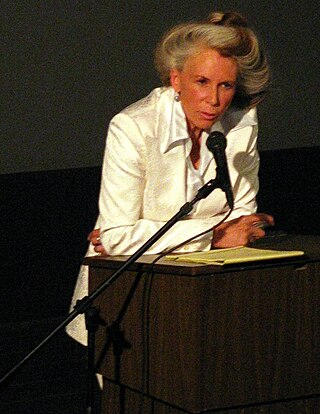
Catharine Alice MacKinnon is an American feminist legal scholar, activist, and author. She is the Elizabeth A. Long Professor of Law at the University of Michigan Law School, where she has been tenured since 1990, and the James Barr Ames Visiting Professor of Law at Harvard Law School. From 2008 to 2012, she was the special gender adviser to the Prosecutor of the International Criminal Court.
Rape pornography is a subgenre of pornography involving the description or depiction of rape. Such pornography either involves simulated rape, wherein sexually consenting adults feign rape, or it involves actual rape. Victims of actual rape may be coerced to feign consent such that the pornography produced deceptively appears as simulated rape or non-rape pornography. The depiction of rape in non-pornographic media is not considered rape pornography. Simulated scenes of rape and other forms of sexual violence have appeared in mainstream cinema, including rape and revenge films, almost since its advent.
Sexual consent is consent to engage in sexual activity. In many jurisdictions, sexual activity without consent is considered rape or other sexual assault.
Feminist views on pornography range from total condemnation of the medium as an inherent form of violence against women to an embracing of some forms as a medium of feminist expression. This debate reflects larger concerns surrounding feminist views on sexuality, and is closely related to those on prostitution, BDSM, and other issues. Pornography has been one of the most divisive issues in feminism, particularly in Anglophone (English-speaking) countries. This division was exemplified in the feminist sex wars of the 1980s, which pitted anti-pornography activists against pro-pornography ones.
Nancy Schwartzman is an American documentary filmmaker, member of the Directors Guild of America, and The Academy.
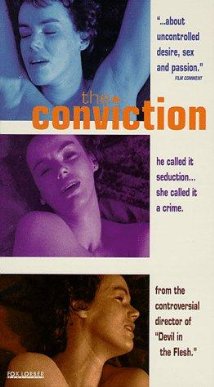
The Conviction is a 1991 Italian drama film directed by Marco Bellocchio. It was entered into the 41st Berlin International Film Festival where it won the Silver Bear Special Jury Prize. Bellocchio wrote the script with his psychotherapist Massimo Fagioli; the two had previously collaborated on the 1986 film Devil in the Flesh.
The following outline is provided as an overview of and topical guide to human sexuality:
Slut-shaming is the practice of criticizing people, especially women and girls, who are perceived to violate expectations of behavior and appearance regarding issues related to sexuality. The term is used to reclaim the word slut and empower women and girls to have agency over their own sexuality. Gender-based violence can be a result of slut-shaming primarily affecting women. It may also be used in reference to gay men, who may face disapproval for promiscuous sexual behaviors. Slut-shaming rarely happens to heterosexual men.
Porn for women, women's porn or women's pornography is pornography aimed specifically at the female market, and often produced by women. It rejects the view that pornography is only for men, and seeks to make porn that women enjoy watching instead of what is being offered in male-centric mainstream pornography.
Anastasia Powell is a feminist criminologist at RMIT University, Melbourne, Australia.

2014 was described as a watershed year for women's rights, by newspapers such as The Guardian. It was described as a year in which women's voices acquired greater legitimacy and authority. Time magazine said 2014 "may have been the best year for women since the dawn of time". However, The Huffington Post called it "a bad year for women, but a good year for feminism". San Francisco writer Rebecca Solnit argued that it was "a year of feminist insurrection against male violence" and a "lurch forward" in the history of feminism, and The Guardian said the "globalisation of protest" at violence against women was "groundbreaking", and that social media had enabled a "new version of feminist solidarity".

Pornhub is a Canadian-owned internet pornography video-sharing website, one of several owned by adult entertainment conglomerate Aylo. As of December 2023, Pornhub is the 14th most visited website in the world and the second most visited adult website after XVideos.
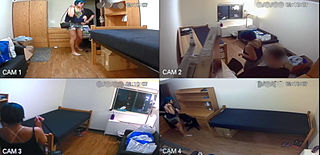
Ceci N'est Pas Un Viol is a work of performance art by American artist Emma Sulkowicz. Released on 3 June 2015, the work consists of a website hosting an eight-minute video, introductory text and an open comments section. The video shows Sulkowicz having sex with an anonymous actor in a dorm room at Columbia University in New York City. It was directed by artist Ted Lawson in early 2015, while Sulkowicz was in the final year of a visual-arts degree at Columbia.

#MeToo is a social movement and awareness campaign against sexual abuse, sexual harassment, and rape culture, in which people publicize their experiences of sexual abuse or sexual harassment. The phrase "Me Too" was initially used in this context on social media in 2006, on Myspace, by sexual assault survivor and activist Tarana Burke. The hashtag #MeToo was used starting in 2017 as a way to draw attention to the magnitude of the problem.
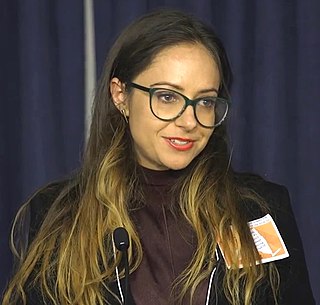
Carrie Goldberg is an American lawyer specializing in sex crimes with her law firm C.A. Goldberg PLLC. She has represented: five clients who described sexual abuse committed by Harvey Weinstein; the former Democrat Member of Congress Katie Hill after her naked photos were published in the media; and the author Emma Cline after an ex-partner sued for plagiarism. Her legal cases with low-profile individuals—involving revenge porn, intimate partner violence and online abuse—often draw national media attention.
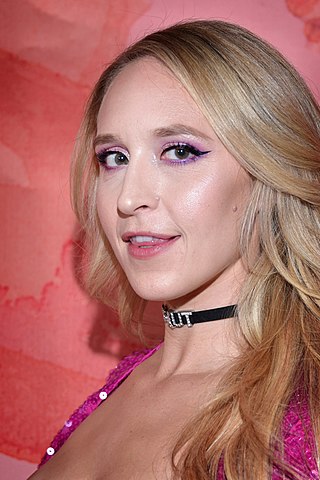
Ginger Banks is an American webcam model, pornographic actress and sex worker advocate.
Deepfake pornography, or simply fake pornography, is a type of synthetic porn that is created via altering already-existing pornographic material by applying deepfake technology to the faces of the actors. The use of deepfake porn has sparked controversy because it involves the making and sharing of realistic videos featuring non-consenting individuals, typically female celebrities, and is sometimes used for revenge porn. Efforts are being made to combat these ethical concerns through legislation and technology-based solutions.
Everyone's Invited is an anti-rape movement organisation based in the United Kingdom, focused on exposing rape culture through "conversation, education and support." It was founded in June 2020 by Soma Sara, and allows survivors of rape culture to share their stories through testimonies shared anonymously on their website and Instagram profile.









